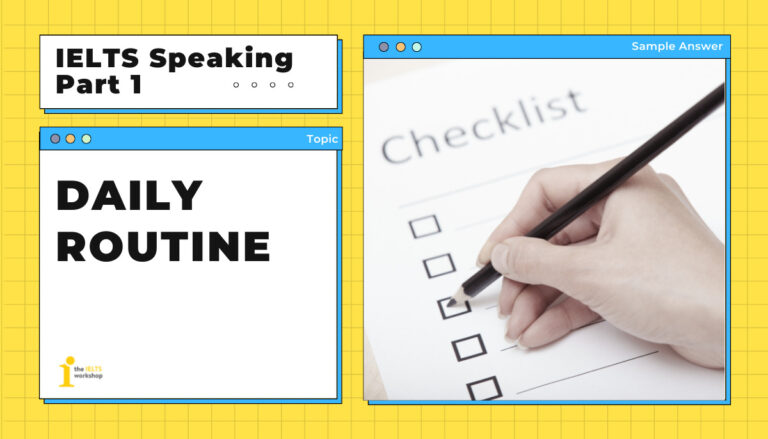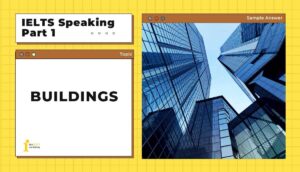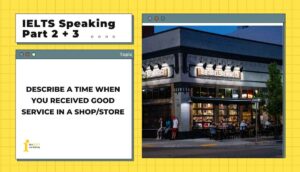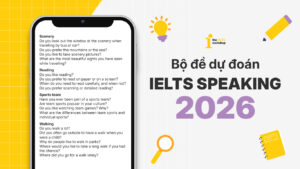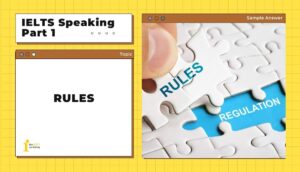Trong chuyên mục giải đề IELTS Speaking lần này, The IELTS Workshop sẽ hướng dẫn cách trả lời câu hỏi của một chủ đề trong IELTS Speaking Part 1 Routine. Cùng tham khảo sample, từ vựng theo chủ đề và một vài cách diễn đạt ghi điểm nhé.
Chủ đề IELTS Speaking Part 1 Routine
IELTS Speaking Part 1 Routine là một trong những chủ đề quen thuộc mà các thí sinh thi IELTS có thể gặp phải. Để đạt điểm cao hãy chuẩn bị kĩ những cấu trúc và từ vựng mạch lạc.
1. What is your daily routine?
I’m not an early bird but I always try my best to get up as early as possible. So that I can have more time to do everything I like. I start my day with a 30-minute exercise. Then I go to work at 8 am and come back home at 5 pm. I often end my day at 12 pm by putting my mind at ease. However, this schedule is not fixed. It depends on the amount of the duties I have.
- An early bird (n): người dậy sớm
- Try one’s best (v): cố gắng hết sức
- Put my mind at ease (v): thư giãn
- Depend on (v): phụ thuộc
2. Have you ever changed your routine?
Yes, I have. I used to work and study at night as I found it easier to concentrate, the silence at night assists me in focusing on my work. However, since I had office work in the morning. I’ve learnt to get used to working and studying during the day. For the first time, I had difficulties concentrating on working. But now, It’s not what I’m comfortable doing, but it’s not too bad to keep up with it.
- Assist in (v): hỗ trợ
- Get used to (v): quen với
- Concentrate on (v): tập trung
- Keep up with (v): theo kịp
3. What part of your day do you like best?
As I mentioned earlier, I used to be a night owl so I tended to prefer the night. However, I’ve converted myself into an early riser and morning has become my favorite time of the day. I find that waking up early and having healthy daily habits like having breakfast, working out and alleviating stress each day. Moreover, the earlier I get up, the more time I have to do a lot of things.
- A night owl (n): Cú đêm
- An early riser (n): Người dậy sớm
- Alleviate stress (v): Xả stress
4. Do you usually have the same routine everyday?
No. As I mentioned above, I don’t have a fixed schedule. I keep an open mind and always strive to upgrade my life from the tiniest things. There is a significant difference. Instead of getting up at dawn, I spend my Sunday on my warm bed. Besides, I try new interests like eating out, reading a book or learning a new sport. New hobby gives me inspiration to work and study more productively.
- Get up at dawn (v): dậy sớm
- Give so inspiration (v): truyền cảm hứng
- Keep an open mind (v): không cứng nhắc, có quan điểm mềm dẻo
- Significant (adj): đáng chú ý
5. What is the busiest part of the day for you?
The evening is not only the part of the day I like but also the busiest part for me. I’m up to my neck in finishing all deadlines before the new day starts. I concentrate on working well because no motivation is as good as the urge to sleep.
- Be up to one’s neck in sth (adj): bận rộn
Bạn có thể làm bài Kiểm tra trình độ tiếng Anh miễn phí để xác định trình độ của bản thân, từ đó đề ra lộ trình ôn luyện hiệu quả.
6. What is your daily study routine?
I’m not the type of person who crams for the exam right the night before so I divide the work into small sections and get them done each day. Therefore I won’t be under the pressure of studying. For example, I’ll usually focus on what I study for 25 minutes straight, then take a five-minute break and then get back to studying. This is a technique called Pomodoro to help you concentrate and study more effectively.
- Cram for the exam (v): Học nhồi gấp rút cho kỳ thi
- Be under the pressure (v): chịu áp lực
7. Do you think it is important to have a daily routine for your study?
Yes. I absolutely have a daily routine to study. I do think having a fixed schedule for what you study is necessary. A daily study routine gives you a big picture of your studying progress and motivation to study harder. Not only do you prioritize what to do first but you also meet deadlines. Without a routine, people tend to work spontaneously and this may lead to reducing study efficiency.
- A big picture of sth (n): Một bức tranh rộng/toàn cảnh về cái gì
- Meet deadline (v): Hoàn thành công việc đúng thời hạn
- Studying progress (n): Tiến trình học
- Spontaneously (adv): Một cách ngẫu hứng
- Study efficiency (n): Hiệu quả học
8. How do you organize your time of study?
To avoid putting pressure on myself, I tend to learn little by little every day. Moreover, I have a plan which is the most important so I can know what I should do first. When I have a great deal of energy, I immediately sit at the desk to push up study efficiency.
- Put pressure on oneself (v): gây áp lực
- Little by little: từ ít một
- A great deal of (adv): nhiều (dùng với danh từ không đếm được)
- Push up (v): đẩy mạnh
Trên đây là sample cho Topic: IELTS Speaking Part 1 Routine. Ngoài ra, bạn cũng có thể truy cập Kho bài mẫu Speaking của The IELTS Workshop để tham khảo nhiều sample answer cho các chủ đề IELTS khác.
Ngoài ra, bạn hãy tham khảo phương pháp xây dựng câu trả lời ngắn gọn cho bài thi IELTS Speaking Part 1 tại khóa học Pre-Senior của The IELTS Workshop nhé.


